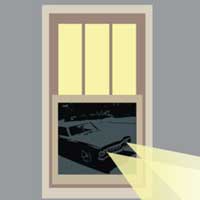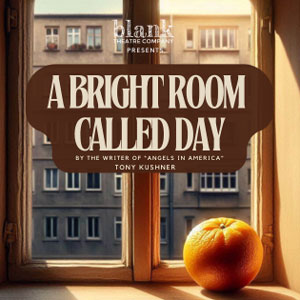
 Somewhat Recommended **I’m always amazed by the extremely small Side Project Theater’s ability to use sophisticated lighting and an idiosyncratic performance space to create a realistic effect (especially when two shows are running at once), but the acting and direction by Devon De Mayo of Scott Barsotti’s play “Jet Black Chevrolet” gets lost in what ultimately is a bizarre and meaningless script, despite its moments of dark humor and high dialogue. Sam (Robert Koon) and Catherine Curie’s (Diana Slickman) son, Zachary, has gone missing. They both have psychotic symptoms (Catherine is in much worse shape than Sam), but it is very hard to figure out whether their extreme insomnia is the cause or a result of their psychosis, and what exactly the role of extreme caffeine intoxication is in all of this (they keep drinking coffee which would seem to qualify as suicidal behavior after “over two weeks without sleeping,” but perhaps I’d be more sympathetic if it were alcohol). During the course of the play, the Curies turn airplanes that fly overhead, their living room furniture, and a Black Chevrolet parked outside the house into “delusions of reference,” assigning them threatening meanings which they don’t actually have and which neither of them can explain (which is fine), but the play never articulates what these things mean either.
Somewhat Recommended **I’m always amazed by the extremely small Side Project Theater’s ability to use sophisticated lighting and an idiosyncratic performance space to create a realistic effect (especially when two shows are running at once), but the acting and direction by Devon De Mayo of Scott Barsotti’s play “Jet Black Chevrolet” gets lost in what ultimately is a bizarre and meaningless script, despite its moments of dark humor and high dialogue. Sam (Robert Koon) and Catherine Curie’s (Diana Slickman) son, Zachary, has gone missing. They both have psychotic symptoms (Catherine is in much worse shape than Sam), but it is very hard to figure out whether their extreme insomnia is the cause or a result of their psychosis, and what exactly the role of extreme caffeine intoxication is in all of this (they keep drinking coffee which would seem to qualify as suicidal behavior after “over two weeks without sleeping,” but perhaps I’d be more sympathetic if it were alcohol). During the course of the play, the Curies turn airplanes that fly overhead, their living room furniture, and a Black Chevrolet parked outside the house into “delusions of reference,” assigning them threatening meanings which they don’t actually have and which neither of them can explain (which is fine), but the play never articulates what these things mean either. 
Yet they have such a large presence in the show (the car is even eponymous), that they should rightly be symbols, but symbols have to mean something, preferably many things which are thematically related. As far as I can tell, these mean nothing at all. The mythic ending is reminiscent of a great deal of The Side Project recent shows, but it adds nothing to the story, and is poorly staged. That said, dialectally Barsotti’s play has its moments. It is at times darkly funny, and it does contain some dialogue that would be lyrical or interesting if, like the “symbols,” its meaning was teased out: “Do you want the right answer or the true one?” Pascal’s Wager aside, for most of us these amount to the same thing, but I’d love to hear about some tension between the two, or even better, see it represented in the plot. Unfortunately, we don’t and it isn’t.
Likewise, at one point a young woman named Julie (Kathryn Acosta), who is bound to the Curies in a complex way through Zachary, tells Sam in reference to someone else’s nightmare, “imagine experiencing the sensation of torturing the person you love most in the world, and being powerless to stop it.” Well, that would be a terrible, powerful, and affecting thing to watch if it were happening, but it isn’t. First off, this couple doesn’t necessarily seem to have terribly warm feelings towards each other (the director and actors might have done something to cultivate a deeper sense of affection between them), and they really aren’t being that awful to anyone except Julie for whom there is no indication that they have ever had very warm feelings to begin with. In fact, given that they’ve both lost their son and are struggling with intense grief and severe mental illness, they behave with remarkable restraint, at least towards each other.
Dianna Slickman’s performance as Catherine Curie is definitely the high-point of this show. She has the gestures, mannerisms, walk, and facial expressions of someone struggling with acute psychosis, but I’m not quite sure whether her character’s mental state has actually reached that level, and she sometimes upstages (in the sense of improperly drawing attention away from) the other two actors with whom she has little chemistry. Robert Koon and Kathryn Acosta read their lines with near-perfect believability (something which is in itself a huge accomplishment in any show), but we never get a sense of any of the characters’ personalities or humanity—this could have been easily accomplished with small mannerisms, especially by Ms. Acosta, whose character is considerably less damaged than Sam or Catherine. Ultimately, the lighting (Ivy Reid), haphazard set (Kristof Janezic), and props (Holly McCauley), in conjunction with script, give us the sense of a bizarre nightmare which is only mildly disturbing because it doesn’t make any sense, and a nightmare so unaffecting that it will happily be forgotten a few hours after waking.
“Jet Black Chevrolet” is running at The Side Project Theatre, which is located at 1439 W. Jarvis Street in the Rogers Park neighborhood of Chicago, through December 21st, 2014. Performances are Wednesdays and Thursday’s at 7:30 pm with Performances on Saturday 3pm and on Sunday’s at 5pm. Regular Tickets are $20 (with 3 dollars off using the code chevy.) Tickets are $15 for seniors and students. Rush Tickets are available at the door for 10 dollars for people with Rogers Park IDs. Group Discounts are available. Call 773-340-0140 for tickets or by visiting the www.sideproject.net
To see what others are saying, visit www.theatreinchicago.com, go to Review Round-up and click at “Jet Black Chevrolet”
\






More Stories
Teatro ZinZanni Chicago “Love Chaos and Dinner”.
“A Bright Room Called Day”
“The Totality of All Things” reviewed by Frank Meccia